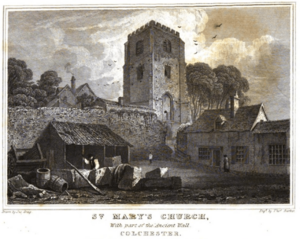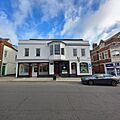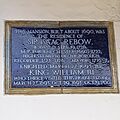Isaac Rebow facts for kids
Quick facts for kids
Sir
Isaac Rebow
|
|
|---|---|
| Born | |
| Baptized | 15 July 1655 |
| Died | September 19, 1726 |
| Resting place | St Mary-at-the-Walls, Colchester |
| Occupation | Clothier and merchant |
| Political party | Whig |
| Spouse(s) |
Mary Lemyng
(m. 1674; died 1681)Mary Macro
(m. 1685; died 1692)Elizabeth Honeywood (née Wiseman)
(m. 1694) |
| Parents |
|
| Member of Parliament for Colchester |
|
| In office 1689–1690 Serving with Samuel Reynolds
|
|
| Preceded by | Sir Walter Clarges and Nathaniel Lawrence |
| Succeeded by | Samuel Reynolds and Edward Cary |
| In office 1692–1714 Serving with Samuel Reynolds (1692-1694), Sir Thomas Cooke (1694-1695), Sir John Morden (1695-1698), Sir Thomas Cooke (1698-1705), Edward Bullock (1705), Sir Thomas Webster (1705-1711), William Gore (1711-1713) and Sir Thomas Webster (1713-1714)
|
|
| Preceded by | Samuel Reynolds and Edward Cary |
| Succeeded by | Sir Thomas Webster and Nicholas Corsellis |
| In office 1715–1722 Serving with Richard Du Cane
|
|
| Preceded by | Sir Thomas Webster and Nicholas Corsellis |
| Succeeded by | Sir Thomas Webster and Matthew Martin |
| Vice-Admiral of Essex | |
| In office 1692–1702 |
|
| Preceded by | Edward Cary |
| Succeeded by | Sir Charles Barrington |
| High Steward of Colchester | |
| In office 1703–1726 |
|
| Preceded by | Aubrey de Vere, 20th Earl of Oxford |
| Succeeded by | Matthew Martin |
Sir Isaac Rebow (1655–1726) was an important English businessman and politician. He worked as a clothier (someone who makes or sells cloth) and a merchant (someone who trades goods). He was also a Member of Parliament (MP) for Colchester for many years. This means he was elected to represent the town in the country's government.
Contents
Early Life and Family
Isaac Rebow was born in Colchester. He was baptized in the Dutch Church there on July 15, 1655. His parents came from important families in Colchester. These families had Flemish (from a region in Belgium) origins.
His father, John Rebow, was also a clothier and merchant. His mother, Sarah, was the daughter of Francis Tayspill. Francis was a wealthy merchant from Colchester. In 1685, John Rebow was given a special "grant of arms." This is a formal recognition of a family's status.
Business Ventures
Isaac Rebow was involved in many different businesses. He seemed to keep his business dealings separate from his political views. He was a member of the Whig political party.
He invested a lot of money in big companies. For example, he put £3,000 into the South Sea Company. This was enough money for him to become a director. He also owned many shares in the East India Company. Between 1697 and 1700, he sent over 10,000 silver pieces to India.
In 1696, he helped collect money for a bank called the National Land Bank. In 1720, he became a director of the new Royal Exchange Assurance company. He also owned a ship that traded goods with Portugal.
Rebow owned land in several English counties. These included Essex, Kent, Suffolk, and Middlesex. He also owned the manor of Gasper. In 1705, he bought Colchester Castle. He bought it from his steward, John Wheeley, who owed him money.
He also had an interest in two lighthouses in Harwich. He got this through his first wife's family. In 1707, he received a special permission. This allowed him to charge all ships that passed these lighthouses.
Political Career
After the Glorious Revolution of 1689, the Whig party became very powerful in Colchester. Isaac Rebow was the most important Whig leader in the town. He was known for being very determined to win elections.
In the 1690s, a practice started in Colchester. People would sell "free burgess" status to political supporters. A burgess was a citizen with special rights, like voting. This was done to help win elections. Rebow was accused of doing this.
These actions led to expensive arguments. They caused financial problems for Colchester. Many of the town's assets had to be used as security for loans. After Rebow died, the town even lost its special charter in 1742.
Despite these issues, Rebow held many important political jobs in Colchester. He was an MP for Colchester in most parliaments from 1689 to 1722. He was always a Whig. He also served as the town's mayor, recorder (a type of judge), and high steward.
First Time as MP
Rebow was first elected as an MP in 1689. He served in the Convention Parliament. This Parliament offered the throne to William III and Mary II.
He lost his seat in the election the next year, in 1690. He tried twice to argue that he had won the most votes. Three polls had been taken, and Rebow was first in all of them. But some of his votes were not counted, and he lost.
Out of Parliament and Re-election
While he was not an MP, Rebow was appointed to the Commission of the Peace in 1690. This group investigated "dangerous persons" trying to leave the country. In August 1692, he became Vice-Admiral of Essex. He was paid to gather 300 men for the navy. He also collected information about smuggled goods.
He was re-elected to the House of Commons in November 1692. In August 1693, he helped Colchester get a new charter. A charter is a document that gives a town special rights. This new charter brought back the town's old rights. It changed rules that had limited voting and required officers to be part of the Church of England. In 1694, he became a freeman of Colchester.
Continuing as MP
Rebow likely won the 1695 election. His election was not challenged. In February 1696, he signed the Association. This document recognized William III as the rightful king.
In June 1696, there was a disagreement about who should be mayor of Colchester. Rebow asked the Privy Council (a group of royal advisors) for help. Even though his request was not successful, his friend John Seabrooke was elected mayor.
In January 1697, Rebow himself was taken into care by the serjeant-at-arms. This happened because he was absent from Parliament without permission. Later that year, the government used his influence. They had two companies of soldiers stay in Colchester.
In 1698, Rebow introduced two bills in Parliament for Colchester. One bill was to make the River Colne easier to travel on. The other was to build hospitals and workhouses in the town. Both bills became law in May.
Around this time, Colchester's cloth trade began to decline. This was a big problem for the town's economy. Exports of cloth fell because of wars and political changes in Europe. This economic struggle was the background for the elections in 1698 and 1701. These elections were not contested. Rebow and Sir Thomas Cooke were the only candidates. This might have been a way to show unity during hard times. People in Colchester sent petitions to Parliament asking for help for the poor and for the town's trade.
Challenges and Later Years
When Queen Anne became queen, Rebow's political power in Colchester started to weaken. He lost his vice-admiralty job in June 1702. He was elected again in August 1702. But the election was declared invalid because his steward, John Wheeley, admitted to using "corrupt practices." Despite this, Rebow won a new election held in December.
In 1703, the job of High Steward of Colchester became open. Rebow wanted the job. He had support from the mayor and other important people. But a group of citizens opposed him. Colchester's other MP, Sir Thomas Cooke, nominated the Queen's husband, Prince George of Denmark. There was a lot of disagreement and confusion. Eventually, Rebow was declared elected.
Rebow continued to serve as an MP. He won the 1705 election. In December 1705, another election happened. The new mayor, John Raynham, who supported Rebow, created over 100 new "free burgesses." Most of these new voters supported the Whig candidate, Sir Thomas Webster, who won.
In 1707, Rebow's son-in-law, Joseph Thurston, became the town's recorder. Rebow also became a trustee for Colchester's grammar school.
In the 1708 election, Rebow and Webster were elected without opposition. In 1709, Rebow started attending town council meetings more often. This was partly because of an economic crisis. He warned the government that "the poor threaten to rise" because of high food prices.
Rebow won the 1710 election. But there was another dispute about the creation of free burgesses. The third candidate, William Gore, successfully argued that he should replace Webster.
In 1711, the arguments over free burgesses paused. It was agreed that all previous admissions would be allowed. But mayors would now need permission to create new ones. However, other political disputes continued. In 1713, Rebow and Webster were re-elected. But the defeated candidates argued against the result. In May 1714, the House of Commons voted that Rebow and Webster had not been properly elected.
Later in 1714, Rebow quickly became a Colchester alderman. This helped him and Webster control the town. In July 1714, Rebow was removed from a list of justices of the peace for Suffolk. This was part of a plan to remove Whigs from power.
After a short break from Parliament, Rebow was elected for the last time in 1715. Later that year, weavers in Colchester asked Parliament for help. They had a dispute with the town's clothiers. Rebow was part of a committee that looked into the issue. The committee found that "the poor weavers had been most previously oppressed." They removed a rule that limited who could make certain types of cloth.
Rebow also served as Mayor of Colchester from 1716 to 1717. He tried to win the 1722 election but was unsuccessful. His last job was as the town's recorder in 1723.
Personal Life and Homes
Isaac Rebow was married three times. His first wife was Mary Lemyng (married 1674, died 1681). His second wife was Mary Macro (married 1685, died 1692). His third wife was Elizabeth Wiseman (married 1694).
Rebow had several children from his first two marriages. Most of them died young. His son, Lemyng Rebow (1676–1717), died before him. Lemyng had two sons:
- Charles Chamberlain Rebow (1702–1753)
- Isaac Lemyng Rebow (1705–1735), who later became an MP.
Two of Rebow's daughters also married:
- Mary (died 1736) married Joseph Thurston. Their children included the poet Joseph Thurston.
- Susan (1687–1769) married Sir Edmund Bacon, 5th Baronet.
Rebow helped fund the rebuilding of St Mary-at-the-Walls church in Colchester. The church had been damaged during the Siege of Colchester. He also put up a monument there for his father. This monument later also remembered Isaac Rebow and his family.
Friends and Homes
Rebow was said to be a personal friend of King William III. The King visited Rebow in Colchester at least three times. He even knighted Rebow when they dined together in March 1693.
The writer Daniel Defoe described Rebow as "a gentleman of a good family and known character." Defoe knew Colchester well. He may have known Rebow personally. They had similar business interests, like cloth and trade with Portugal.
Rebow had two main homes. One was in Colchester and the other was in Pall Mall, London. His Colchester home on Head Street was described as a "very good house." It was built in the late 1600s. It might have used parts of an older building. It also had medieval cellars, which he may have used for storing goods.
An inventory from 1735 listed many rooms in the house. It had seventeen rooms, two servants' attics, cellars, a place for brewing, yards, a stable, and a coach house. The house's current front and bay window were added later. Inside, some of the original wood panels and fireplaces from Rebow's time are still there. The house is now a Grade II* listed building. It is called Rebow House.
Behind the house, there used to be large gardens. A road called Sir Isaac's Walk runs next to the house. The historian Philip Morant said Rebow "gravelled and made handsome" this road.
Death and Legacy
Isaac Rebow died on September 19, 1726. He was buried in St Mary-at-the-Walls church in Colchester. He asked to be buried "privately" without a big funeral.
His Will
Since his son Lemyng Rebow died before him, Isaac Rebow left most of his property to Lemyng's younger son, Isaac Lemyng Rebow. This included most of his land in Essex, Kent, Suffolk, and Middlesex. He also left him a "great diamond ring."
Charles Chamberlain Rebow, Lemyng's older son, only received Colchester Castle. This was because his grandfather called him a "disobedient and undutiful grandson."
His daughter Susan, Lady Bacon, received his London home. She also got her mother's diamond necklace and portrait, and £2,000. His other surviving daughter, Mary Thurston, received her mother's pearl necklace. Her children each received £1,000.
He also left money to Colchester's Dutch Church. He gave money to the poor of St Mary-on-the-Walls parish. And he left money for the upkeep of his father's monument there.
Political Family
Three other members of the Rebow family later became MPs for Colchester. Two were direct descendants: his grandson Isaac Lemyng Rebow (1734–1735) and his great-grandson Isaac Martin Rebow (1755–1781).
According to Sir Isaac Rebow's will, if there were no male descendants, the husbands of female descendants had to take the Rebow surname to inherit the family estates. This happened with John Gurdon Rebow. He was the husband of Isaac Rebow's great-great-great-granddaughter. John Gurdon Rebow was an MP for Colchester from 1857 to 1859 and from 1865 to 1870.
Images for kids
 | May Edward Chinn |
 | Rebecca Cole |
 | Alexa Canady |
 | Dorothy Lavinia Brown |




